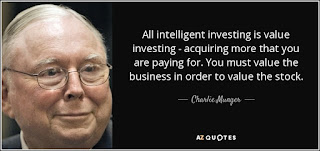In a December post I walked through the Dividend
Farming investing style. The discussion outlined several principles I’ve
followed through the years. While the
Dividend Farming framework may or may not work for you I thought it helpful to
research investing philosophies and how budding Dividend Farmers might build
their own.
 |
| Act as if you're buying the business, not just the stock. |
Because Dividend Farming is dividend investing
for the DIY I turned to the American Association of Individual Investors (AAII)
in my research. Sifting through great
material on the AAII site I discovered an article covering 10
Questions that will Help Define Your Investing Philosophy. Dividend Farmer responses
are aligned with the respective AAII questions for consideration and food for
thought as you build your own investing philosophy.
1. What are your core
investment beliefs?
Invest in dividend paying firms with
similar characteristics to Benjamin Graham’s (Intelligent Investor, Securities
Analysis) conservative investment selection criteria including size, market
leadership, history of dividend payments, and financial strength.
2. Do you understand your
philosophy and why you believe in it?
Dividend Farmer believes in this
philosophy because it concentrates on investing as an owner, focusing on margin
of safety, and developing a consistent cash flow stream.
3. Do you know the
potential risks?
The primary risk includes the
opportunity / cost of missing a growth oriented stock that goes through the
roof. Secondary risks include lagging
the market in stock valuation or falling short of the inflation rate.
4. Does it suit your
personality and individual circumstances?
Optimizing cash flow and minimizing risk are business practices
I follow in my work as a technology product manager. As the head of a single-income household,
developing a reliable, passive income stream to supplement my salary is
important. Building slowly,
consistently, through time is comfortable and well suited to a farming mindset.
5. Will your philosophy
help you follow whatever strategy you implement?
It has for over a decade and will continue doing so through the rest
of my time as an investor. It’s unlikely
I will trend away from conservative, cash generating, investments that provide
an opportunity for compounded growth into the future.
6. What constraints are
necessary for turning your philosophy into a portfolio?
Initially, I believed the constraint would be too few issues
meeting the conservative, dividend paying criteria with which to build a
diversified portfolio. Courtesy of
resources like DRIP
Investing and others, that constraint is no longer a concern.
7. What will you own and
why will you own it?
Anything from agricultural firms to financials, manufacturers,
health care plays, REITs, telecoms, and utilities are dividend paying stocks found
in my portfolios. I’ll stick primarily
to large cap firms with lengthy dividend payment histories, particularly those
with a track record of consistent growth in their dividend payments. These holdings address the passive income
stream growth I’m building while limiting risk as much as possible.
8. What will cause you to
buy or sell?
Warren Buffett and Dividend Farmer both have a favorite holding
period of forever. However, when holdings
fall well short of investment goals and are struggling relative to the
conservative selection methods outlined above, I’ll sell the holding. GE, which I sold a couple years ago, comes to
mind.
9. What will cause you to
make changes to your portfolio over time?
Most of my portfolio changes are additions when a new firm is
discovered that has great characteristics and might bulk up an under-weight
segment of my portfolio or at worst won’t create a significantly over-weight
position by adding it. Otherwise, sales
changes occur per #8 above.
10. What types of
investments or strategies will you avoid?
Investments avoided include IPOs, aggressive growth stocks,
mutual funds (except in retirement funds where they are the only option), ETFs,
bonds, penny stocks, complex instruments, day-trading, technical trading,
annuities, and direct real estate holdings.
These are great
questions with which to start building your investment philosophy. If you discover through this exercise that
Dividend Farming is not a fit for you, that’s ok. It means you’ve learned something about
yourself that will be helpful to your investing future. Alternatively, you may discover that Dividend
Farming is a natural fit. If so, welcome
to the farm and value-based dividend investing for the DIY investor!
The
thoughts and opinions expressed here are those of the author, who is not a
financial professional. Opinions expressed should not be considered
investment advice. They are presented for discussion and entertainment
purposes only. For specific investment advice or assistance, please
contact a registered investment advisor, licensed broker, or other financial professional.
No comments:
Post a Comment